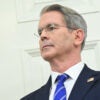The People’s Republic of China’s (PRC’s) relationship with Iran receives a good deal of attention. As the U.S. considers how to stop Iran’s nuclear weapons program short of military action, the PRC is considered vital in ensuring economic sanctions are effective. But it has been difficult to win Chinese cooperation in applying sanctions. One mistake the U.S. may have made is treating China as a unified entity.
It is true, of course, that the PRC has a tightly controlled political system. There is one ruling party, a powerless legislature, and muzzled debate. Even so, distinct interests have emerged.
State-owned enterprises rarely operated internationally a decade ago and, if they did, unfailingly followed the central government line, as when China Unicom was nationalized in 1999. One outcome of state-led development since 2003 is powerful growth by state firms. By some measures, State Grid is the world’s biggest power company, China Mobile the biggest telecom, and ICBC the biggest bank.
The Daily Signal depends on the support of readers like you. Donate now
The PRC’s global presence is also much greater. Chinese firms are the world’s biggest exporters. From 2005 to 2011, Chinese outward investment exceeded $300 billion, even excluding bonds.
China’s corporate kings are the two largest oil companies, both state-owned: CNPC and Sinopec. Both rank in Fortune’s top 10 globally. They are the two biggest owners of foreign non-bond assets, accounting for more than 25 percent of outward investment—more than $80 billion—by themselves. CNPC and Sinopec own stakes in Canadian oil projects; CNPC sends Venezuelan oil to the U.S. for refining; and Sinopec has just made a sizable U.S. shale deal. They also have made large acquisitions in Europe.
Iran has been an important target, with CNPC and Sinopec each having multibillion-dollar projects. However, there are indications that both, along with smaller cousin China National Offshore Oil, have slowed recent work. Why? It probably wasn’t orders from Beijing. Rather, proceeding with their considerable business in Iran in the face of sanctions would put much more of their global business at risk.
More important, the internal political role of these companies is underappreciated. When push comes to shove, they follow government orders. But they first do some nudging of their own. CNPC and Sinopec are the two biggest contributors of tax revenue. They directly employ more than 2 million people and are crucial to the jobs of many more. They are vital in Beijing’s strategy of securing ever-growing oil imports. Thus, their relationship with the central government is no longer one-way, and they cannot be happy with the prospect of the PRC bucking stronger international sanctions.
This is the proper context in which to understand the decision by the Obama Administration to punish Chinese company Zhuhai Zhenrong. It will accomplish nothing in itself, but it will catch the attention of CNPC and Sinopec, as Zhenrong is also a centrally controlled energy enterprise (if much smaller).
The U.S. cannot negotiate directly with CNPC and Sinopec. It certainly should not expect them to defy the Communist Party. But welcoming Sinopec investment here while sanctioning Zhenrong sends an indirect signal. Because China is not a single entity, such signals are likely to prove more effective than traditional policy has been.





























